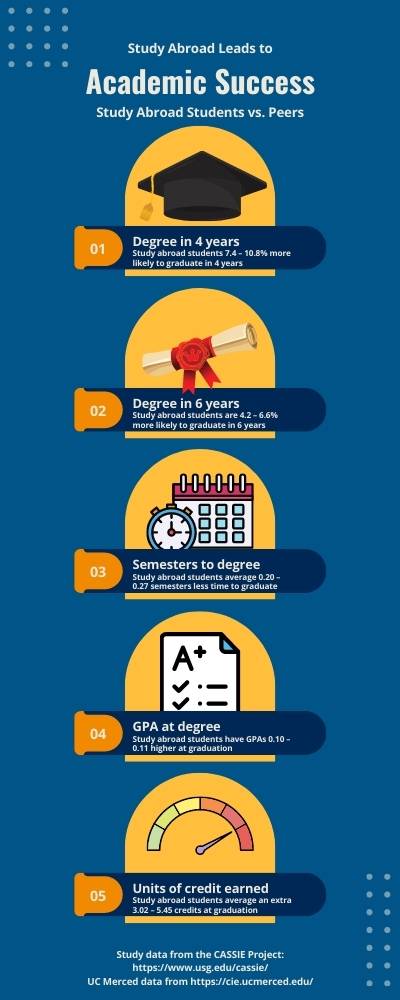
Study abroad students on average complete their degrees more quickly than their peers
New data from the CASSIE (The Consortium for Analysis of Student Success through International Education) project explores the impacts of study abroad on student academic success. The CASSIE project report, released in spring 2022, studies metrics for student success for more than 30,000 students across 36 U.S. universities of various profiles. Controlling for numerous academic and demographic factors to tease apart correlation from causality, the project aims to identify how study abroad impacts student success.
The project identified another success indicator for students: time to graduation. Study Abroad students graduate more quickly than their peers. This holds true across a number of student groups, but the impact is magnified for students who might fall into the following categories:
- Need-based financial aid recipients
- Underrepresented minority groups*
- First-generation college students
- STEM and non-STEM students alike, but greater gains for non-STEM students
Summarized findings
Over the last month, we have examined different metrics used for measuring improved academic success. We saw that students who study abroad:
- Are more likely to graduate
- Have higher GPAs
- Complete more units
This time, we are looking at a funny-sounding metric: time-to-degree. This is essentially how long it takes students to complete a degree or, as we compare it to the norm or the control group, how much the time-to-degree improves (i.e. is reduced) for the average study abroad student.
Based on UC Merced's 2021-22 enrollment profile, the predicted improvement in the time-to-degree metric for study abroad students would be at least 0.20 to 0.27 semesters more quickly than their peers.
Why this matters
This means more students will complete their degrees an extra semester earlier. Completing a degree even six (6) months earlier could mean $27,630 in extra earnings, thousands of dollars saved toward retirement, $4,250 less in student loans, and reduced loan repayments.
* Underrepresented minority groups, as defined by the CASSIE project includes the following:
- American Indian/Alaskan Native,
- Black or African American,
- Hispanic, and
- Native Hawaiian/Pacific Islander




